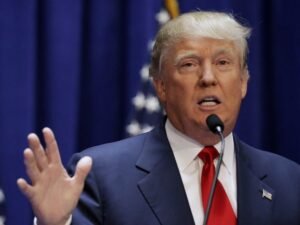Elon Musk’s Rightward Shift: Impact and Speculation on Political Support for Trump
Since assuming control of Twitter, Elon Musk has notably shifted towards right-wing politics, challenging the conventional perception that Silicon Valley is predominantly liberal-leaning. Previously viewed as politically neutral, Musk now espouses staunchly right-wing ideologies through his platform, now known as X, echoing themes commonly found on Fox News, conservative talk radio, and far-right movements. In a recent instance, Musk echoed a conspiracy theory circulating in far-right circles, suggesting that President Joe Biden was importing migrants to secure votes and ominously hinting at a scenario “far worse than 9/11.”
Speculation abounds regarding whether the world’s second-richest individual will throw his support, and considerable financial resources, behind former US President Donald Trump’s bid to reclaim the White House.
Recent reports from The New York Times, indicating a meeting between Musk, Trump, and other Republican donors in Florida, have fueled intense speculation. Trump’s campaign fundraising efforts are notably lagging behind President Biden’s, despite securing the Republican nomination. Musk’s immense wealth could potentially bridge this gap.

Silicon Valley’s Conservative Turn
While Musk has explicitly stated on X that he won’t be financially backing either presidential candidate, the intricacies of US election financing raise concerns among Biden supporters. There’s apprehension that Musk could change his stance, support political committees indirectly aiding Trump’s cause, or employ alternative methods to bolster the Republican campaign.
Musk isn’t the only figure in Silicon Valley pushing conservative agendas, signaling a shift in a traditionally liberal stronghold. Despite Trump receiving less than 25 percent of the vote in Silicon Valley in 2020, other tech leaders are rallying around conservative causes, defying the region’s political norms.
Marc Andreessen, a prominent figure in this movement, co-founded Netscape and now co-manages Andreessen Horowitz, a major venture capital firm. Formerly associated with left-of-center politics and close to figures like Al Gore, Andreessen now actively opposes progressive priorities, particularly issues related to “woke” ideologies regarding equality and workplace inclusivity. In a lengthy manifesto, he outlined a techno-utopian future while dismissing government intervention, regulation, and concerns about discrimination as obstacles.
Silicon Valley’s Wave: Investments, Politics, and Evolving Perspectives
Andreessen’s firm, like many others in this ideological shift, heavily invests in cryptocurrencies and has established a political fund to challenge lawmakers, regardless of party affiliation, seeking stricter regulations on the industry.
Some analysts, such as Carolina Milanesi, suggest that this outspokenness reflects concern among established figures in Silicon Valley about the changing landscape, particularly regarding issues like diversity, equality, and sustainability, which challenge the status quo.
A podcast called “All-In,” featuring tech elites including David Sacks, a member of the early PayPal team, and Peter Thiel, another PayPal veteran known for his conservative views, serves as a platform for discussing current events and technological advancements. Thiel, who aligned himself with Trump during his presidency, distanced himself from politics after the Capitol riot in 2021 but remains a respected figure within Silicon Valley’s right-leaning circles.
Tech Industry Under Fire: Conservative Critique and Backlash Against Woke AI
The growing influence of the new conservative guard is making an impact, particularly evident in the tech industry where diversity-focused companies are facing criticism. Issues such as drug-related problems and crime in San Francisco, or concerns that generative AI has become overly “woke,” are putting these companies on the defensive.
Google CEO Sundar Pichai recently faced backlash, leading to a dip in the company’s stock value, when it was revealed that its newly launched Gemini AI app produced images depicting ethnically diverse World War II Nazi troops and other historically inaccurate content.
David Sacks, speaking on an episode of the All-In podcast titled “Google’s woke AI disaster,” criticized Google AI’s leadership for injecting their liberal biases into their work. Google’s response reflected a recognition of the conservative pushback, with Pichai deeming the AI mishap “completely unacceptable,” and co-founder Sergey Brin acknowledging the error in generating what he described as “far-left” imagery.











Comments 1